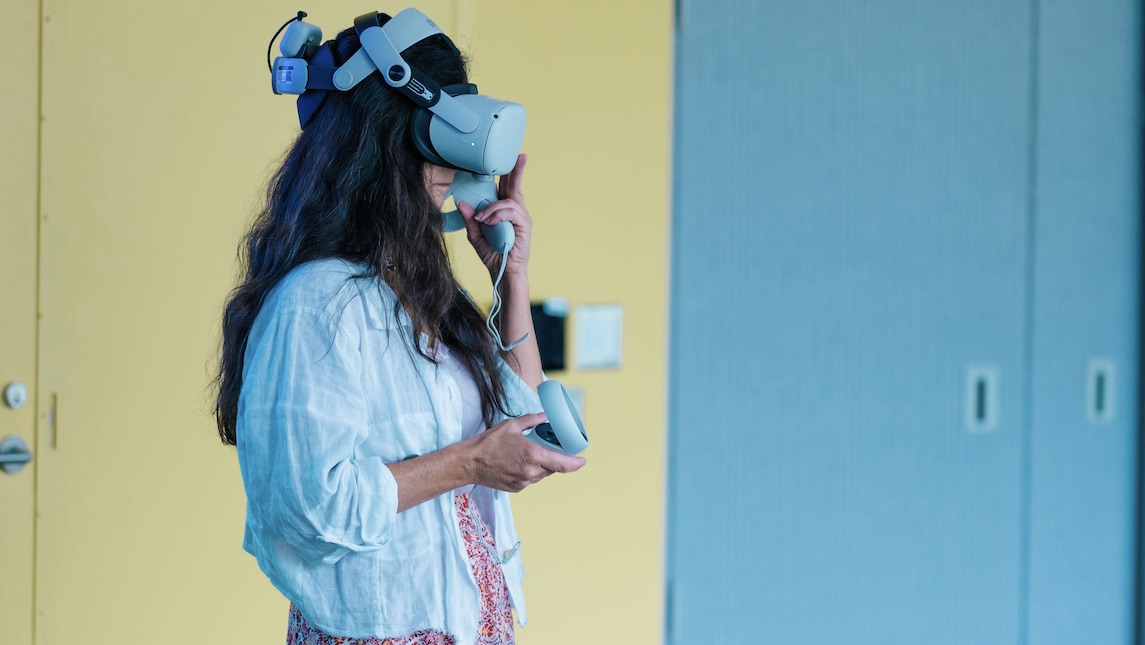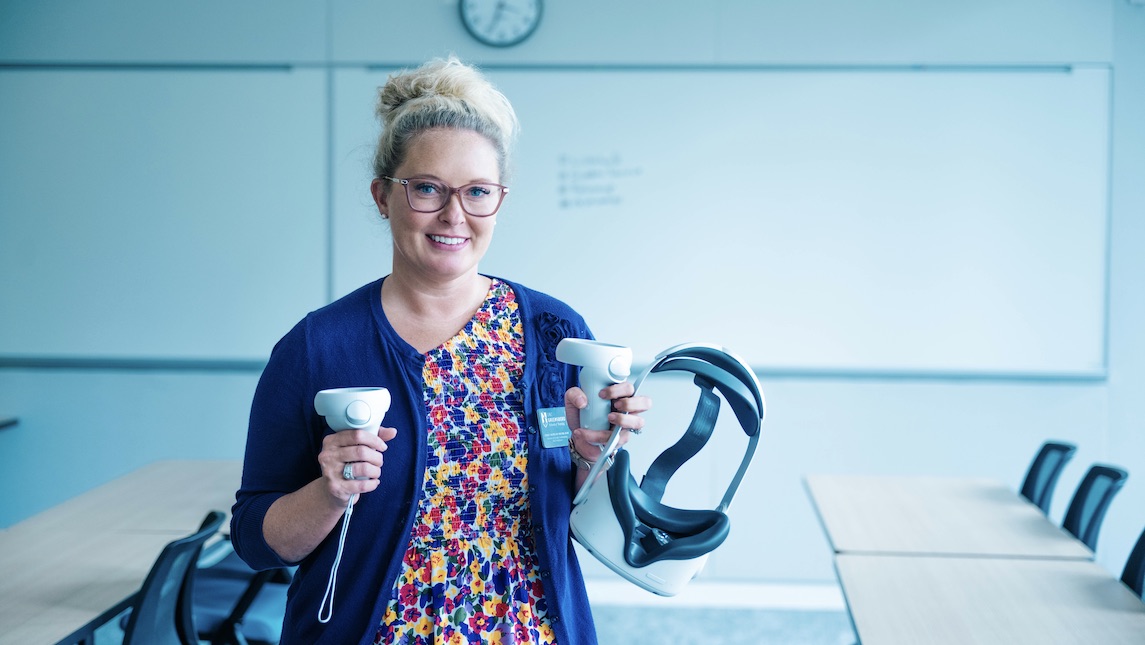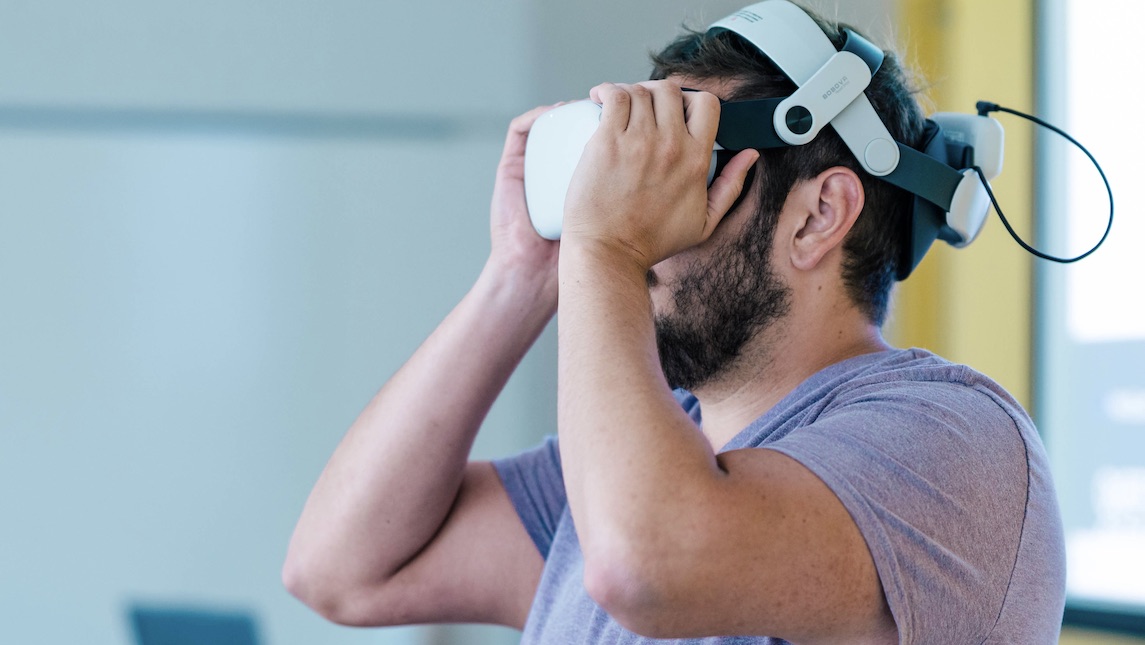UNC Greensboro’s School of Nursing (SON) is using artificial intelligence (AI) to improve and enhance nursing instruction, patient care, and nursing practice with virtual tools that create enriching real-world experiences, underscore ownership, and increase engagement.
The immediate integration of practical experience has been a game changer, says Lindsay Draper, clinical associate professor and nursing’s director of faculty credentialing, compliance, and special initiatives.
“We can talk about a health condition in class and then put on virtual-reality headsets to practice taking care of a patient,” she says. “Right then and there, they’re able to connect theory with clinical practice before they ever get to a clinical setting.”
Further, students say virtual experiences make them feel more confident, competent, and empowered.
“They don’t have their preceptor or instructor to watch their every move – they are the nurse, and they make the decisions,” Draper says. “They tell us it’s the most they’ve felt like a nurse since starting nursing school, even after their first time in the headset, and that is a really cool thing.”
How Are We Not Using AI?
From integrated simulations to dynamic student and faculty tools, AI has played a prominent role across the UNCG Nursing educational experience.
“The big question is how are we not using AI,” Draper says, “Because it is a helpful tool to create unique, realistic patient scenarios for our students that mirror the real world.”
If the topic is diabetes, students can use AI to assess patients, determine what labs a nurse might need, and develop questions for patient conversations.
“Explaining concepts to patients is very challenging in health care,” she says. “As nurses, we understand what we’re talking about, but that doesn’t always translate to the patient, their family members, and the community.”
Students are also able to create their own case studies, then reflect on the experience: What was the AI response? What was missing or may have been incorrect?
“So, it prompts critical thinking in addition to learning,” Draper says. “It’s a wonderful tool for a more comprehensive approach to engagement, relevance, and ownership in education.”

Virtual Reality: Collaboration, Retention
Since 2023, the SON has integrated VR into the undergraduate and nurse practitioner programs, specifically as a simulation tool. They use MetaQuest2 headsets and Oxford Medical Simulation, which offers access to more than 230 scenarios and the option to create unique scenarios.
“If we have a regular simulation with a standardized patient, only so many students can participate at one time,” Draper says. “With VR, we can supplement for those not actively engaged in the scenario.”
“We can do small groups or have one person wear the headset while it’s screen-casting to a TV, so other students can see what they’re seeing,” Draper says. “It has reduced downtime in simulation and helped to make it a more rewarding experience.”
Nikolas Everhart, a senior nursing student who will graduate in May 2025, appreciated the use of VR for learning about pre-eclampsia: “It essentially provided a risk-free pathway to learn and deepened my understanding of obstetrical patient care.”
Draper also points to benefits for nursing graduates taking the national board exam, which is based on scenario-based application of learning. Because AI tools offer the opportunity to hear it, see it, then do it, students better retain information.
In the future, SON hopes to incorporate augmented reality with student VR experience and explore how VR can be used for interprofessional education and in mass-casualty simulations for disaster preparedness.
Other Uses of AI
Faculty are using AI to create course descriptions; to design, improve and revise curriculum; to streamline assignments from learning objectives; and to generate rubrics.
“Health care and nursing can be complex, and AI is a really good tool to simplify instruction and make content more relevant to students,” Draper says.
SON has used AI to create its new master’s curriculum, its undergraduate curriculum, and its DNP curriculum, which consolidated efforts and inspired creative ideas. These curricula are in the approval process and should be available to students in Fall 2025.
Students in NUR 375 Nursing Informatics and Technology 2 were asked to use AI to create class assignments for a designated week.
“The use of AI was mind-blowing to me at first,” says nursing student Richelle Hensen. “However, I quickly became aware of AI’s value in creating assignments, test questions, or outlines for studying. AI thinks creatively and can illuminate new avenues in nursing studies. I do fear it could be used too much.”


Critical Thinking Required
Draper is not at all concerned with the views that AI will halt learning.
“I think it’s the exact opposite,” Draper says. “Used correctly, AI is going to help people get smarter because there’s that critical thinking piece, an evaluation process, and creativity involved.”
“It’s not a passive tool; it doesn’t do anything unless you do something with it,” she says. “And that’s why we’re teaching our students, from the get-go, how to use it to enhance their learning, not replace their thinking.”
Draper says balanced integration of AI is paramount for both faculty and students: What is AI? How to use it ethically and responsibly? What does academic integrity look like when you start using AI?
A module developed as part of the UNCG AI Teaching Grants will be implemented across three courses in various nursing programs to address these critical questions.
What’s Ahead?
As SON builds multiple dynamic uses of AI, they also spread the word and hope to bring others along.
“We are all in” says Dean Debra Barksdale. “AI is transforming student learning, faculty productivity, and patient care.”
Barksdale and several UNCG nursing faculty contribute to these advancements through their roles in the National Organization of Nurse Practitioner Faculties (NONPF) AI special interest group. Additionally, as liaison to the American Academy of Nursing’s AI Task Force, Barksdale will shape health policy and address ethical AI use.
“We think about how we can share what we’re doing here in the School of Nursing, not only with the campus, but with the broader community as well,” Draper says.
That includes speaking at conferences and to various groups across the state about the changing state of health care and using AI to prepare and upskill the workforce.
“We also continue to explore how we better introduce and incorporate AI tools students will use in practice into the academic setting,” Draper says.

Story written by Juliana Proffitt McCully, AMBCopy LLC
Photography provided by Sean Norona, University Communications








